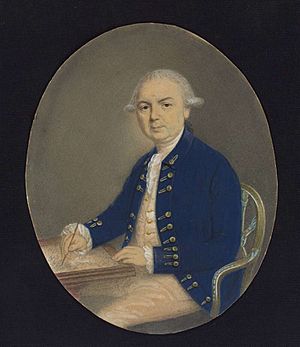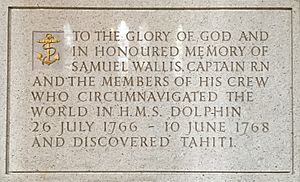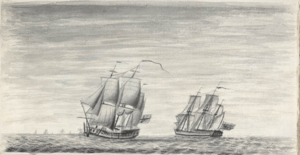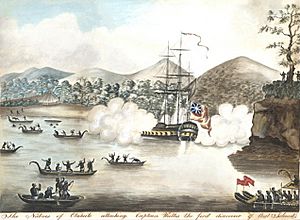Samuel Wallis facts for kids
Quick facts for kids
Samuel Wallis
|
|
|---|---|

Portrait of Samuel Wallis by Henry Stubble, c. 1785
|
|
| Born | 23 April 1723 Fentenwoon, Cornwall |
| Died | 21 January 1795 (aged 71) Devonshire Street, London |
| Allegiance | Kingdom of Great Britain |
| Service/ |
Royal Navy |
| Years of service | c.1748–1795 |
| Rank | Captain |
| Commands held | HMS Swan HMS Port Mahon HMS Prince of Orange HMS Dolphin HMS Torbay HMS Dublin HMS Queen |
| Battles/wars | Seven Years' War American Revolutionary War |
| Spouse(s) | Betty Hearle |
| Other work | Extra Commissioner of the Navy |

Samuel Wallis (born April 23, 1728 – died January 21, 1795 in London) was a British naval officer. He was an explorer of the Pacific Ocean. He was the first European navigator to officially visit Tahiti.
Contents
Samuel Wallis was born at Fenteroon Farm. This farm is near Camelford in Cornwall, England. He joined the Royal Navy and served under another famous explorer, John Byron.
In 1757, Wallis was promoted to the rank of captain. This was a big step in his career.
Captain Wallis was given command of a ship called HMS Dolphin. He was also the leader of an important expedition. Another ship, HMS Swallow, sailed with him. Its captain was Philip Carteret.
Their main goal was to sail all the way around the world. They also hoped to find a large continent in the Southern Hemisphere. This continent was often called the "Southern Continent" at the time.
Journey Through the Strait of Magellan
The two ships began their long journey. They sailed through the Strait of Magellan. This is a difficult passage at the southern tip of South America. After passing through, a big storm hit their ships. The storm was so strong that the Dolphin and the Swallow got separated.
Discovering Tahiti
In June 1767, Captain Wallis and his crew made an exciting discovery. They became the first Europeans to land on the island of Tahiti. Wallis named the island "King George the Third's Island." He did this to honor the King of Great Britain, King George III.
Wallis himself was not feeling well. He stayed in his cabin on the ship. So, his lieutenant, Tobias Furneaux, was the first to step onto the island. Furneaux raised a flag and claimed the island for the King. Wallis later described Tahiti as a wonderful place. He said it had a great climate and was "one of the most healthy as well as delightful spots in the world."
Exploring More Islands
The Dolphin stayed in Matavai Bay in Tahiti for more than a month. During this time, Wallis explored the area. He named or renamed several other islands. These included five islands in the Society Islands group. He also named six small islands, called atolls, in the Tuamotu Islands.
Wallis also confirmed the locations of Rongerik and Rongelap. These are two islands in the Marshall Islands. He even named a Polynesian island after himself. This island, Uvea, became known as Wallis Island.
After his discoveries, Wallis continued his journey. He sailed to Batavia (which is now Jakarta, Indonesia). Sadly, many of his crew became sick there. They suffered from dysentery, a serious illness. From Batavia, they sailed around the Cape of Good Hope in Africa. They finally arrived back in England in May 1768.
Later Life and Legacy
When Wallis returned to England, he had valuable information. He shared his maps and notes with another famous explorer, James Cook. Cook was getting ready for his own journey to the Pacific Ocean. Some of the sailors who had been with Wallis on the Dolphin even joined Cook's crew. It is not known if Wallis and Cook met in person before Cook left in August 1768.
In 1780, Wallis was given a special role. He became an Extra Commissioner of the Navy. This meant he helped manage the British Navy's affairs.
Samuel Wallis is remembered for his important voyages. His exploration helped to map the vast Pacific Ocean.
See also
 In Spanish: Samuel Wallis para niños
In Spanish: Samuel Wallis para niños
- European and American voyages of scientific exploration
 | Toni Morrison |
 | Barack Obama |
 | Martin Luther King Jr. |
 | Ralph Bunche |



